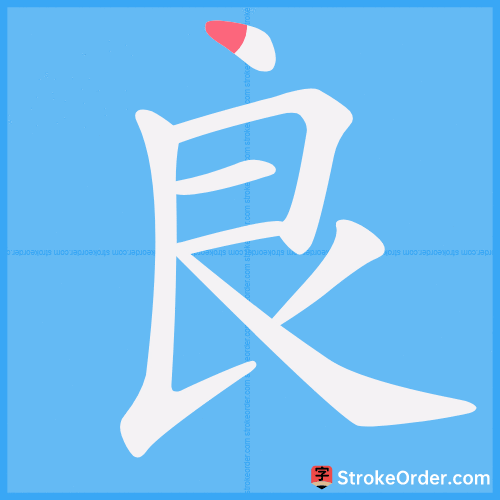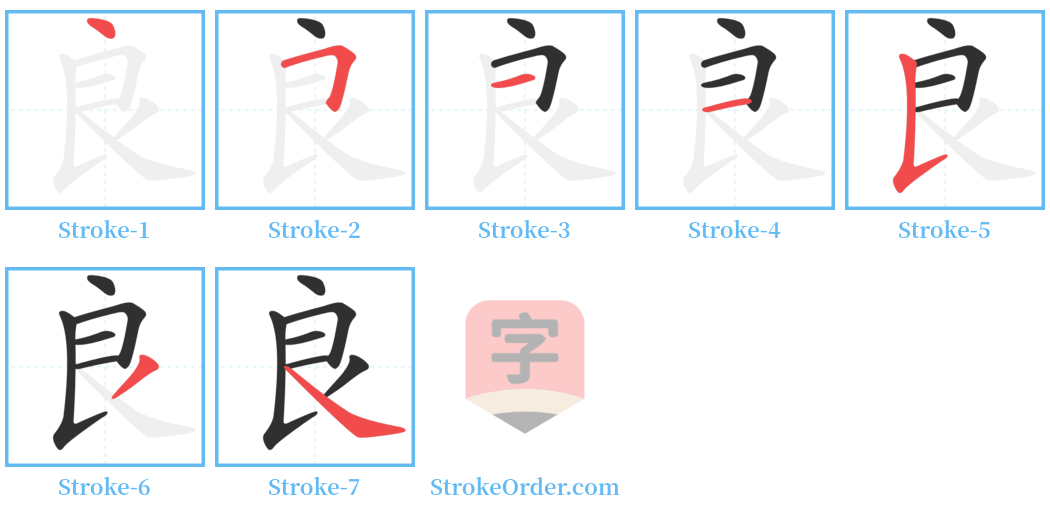良 Stroke Order
Animated Stroke Order of 良

Stroke Order Diagrams for 良

Step-by-Step Handwriting Guide for 良

Learn to Write Chinese Characters with Video Tutorials
Watch the video of writing the Chinese character "良", learn the correct stroke order (笔顺) of the character "良", and master the standard way of writing the character "良".
Free Printable Handwriting Practice with Stroke Order: 良
Printable Writing Practice Worksheet of "良" in Portrait Orientation (Tian Zi Ge)

Printable Writing Practice Worksheet of "良" in Landscape Orientation (Tian Zi Ge)

Information of 良
Pinyin
liáng
Radical
艮
Strokes
7 strokes
Usage
★★★★★
Definition
good / very / very much
良 [liáng]
1. 好: good
例如: 使~好。善~。~辰美景。消化不~。~莠不齐。
(e.g., to make good; good and kind; a good time and beautiful scenery; poor digestion; good and bad are uneven.)
2. 善良的人: kindhearted person
例如: 除暴安~。
(e.g., to suppress violence and maintain peace.)
3. 很: very
例如: ~久。获益~多。用心~苦。
(e.g., for a long time; to gain a lot; to be deeply devoted.)
4. 姓: surname
(e.g., a common Chinese surname.)
本义: 善良 (Original meaning: good and honest)
形声: 形声 (Phono-semantic compound character)
同本义: good and honest; kindhearted
例如:
1. 《说文》: 良,善也。
2. 《诗·邶风·日月》: 德音无良。
3. 《诗·鄘风·鹑之奔奔》: 人之无良。
4. 诸葛亮《出师表》: 侍中、侍郎郭攸之、费袆、董允等,此皆良实。
(e.g., "Shuowen": 良 means good; extracts from classical texts mentioning the term to illustrate its use.)
良好; 美好: good; fine; nice
例如:
1. 《吕氏春秋·察今》: 良剑期乎断,不期乎镆铘; 良马期乎千里,不期乎骥骜。
2. 《玉台新咏·古诗为焦仲卿妻作》: 故作不良计,勿复怨鬼神。
3. 晋·陶渊明《桃花源记》: 良田美池。
4. 《史记·廉颇蔺相如列传》: 赵之良将。
5. 《淮南子·人间训》: 富家良马。
(e.g., referencing historical works to show the positive attributes tied to the character.)
优秀: excellent
例如:
1. 《孟子》: 天下之良工也。
(e.g., "Mencius": the best craftsmen in the world.)
和悦; 和善: amiable; amicable; genial
例如:
1. 《荀子·非十二子》: 其容良。
(e.g., "Xunzi": he is amiable.)
大: big; great
例如:
1. 良鱼 (big fish);
2. 良枣 (large jujube);
3. 良器 (great talent).
吉祥: lucky
例如:
1. 良月 (auspicious month);
2. 良贞 (auspicious divination);
3. 良时 (favorable occasions).
和乐; 欢悦: happy
例如:
1. 良晤 (joyful meeting);
2. 良游 (enjoyable travel);
3. 良聚 (pleasant gatherings).
长,久; 深: long; deep
例如:
1. 良夜 (long night);
2. 良宵 (long evening).
通 “谅”:诚实,信实: honest
例如:
1. 《荀子·修身》: 知虑渐深,则一之以易良。
(e.g., "Xunzi": as one's foresight deepens, so too must one's honesty.)
副词:
1. 很,甚,极其,非常: truly; very
例如:
1. 《水经注》: 清荣峻茂,良多趣味。
(e.g. citing classic literature demonstrating the use of "良" as an adverb.)
2. 确实;果然: certainly
例如:
1. 《史记·赵世家》: 諸將皆以爲趙氏孤兒良已死,皆喜。
(e.g., "Records of the Grand Historian": all the generals agreed that the Zhao family orphan had indeed died.)
名词:
1. 首; 头: head
例如:
1. 《孟子》: 人之所不学而能者,良能也。
(e.g., "Mencius": those abilities that people do not learn but can possess.)
2. 首领; 首长: boss; chief; chieftain
例如:
1. 《左传》: 右无良焉,必败。
(e.g., "Zuo Zhuan": if there are no capable leaders on the right side, there will be certain defeat.)
3. 遵纪守法的公民: law-abiding people
例如:
1. 除暴安良 (suppressing violence and stabilizing peace).
4. 通 “埌”: 坟墓: grave
例如:
1. 《庄子·列御寇》: 阖胡尝视其良,既为秋柏之实矣?
(e.g., "Zhuangzi": did he once ponder the graves?)
动词:
1. 认为好: have a high opinion of; think highly of
例如:
1. 《左传》: 良司臣而逸之。
(e.g., "Zuo Zhuan": to regard ministers highly and give them solace.)
2. 能够: can
例如:
1. 《左传·昭公十八年》: 吾身泯焉,弗良及也。
(e.g., "Zuo Zhuan": if I disappear, there will be no one to help.)
3. 善于: be good at
例如:
1. 良民吏 (official good at managing the populace);
2. 良冶 (craftsman exceptionally skilled in metallurgy).
positive (in its effect) / leading to good consequences / virtuous / (medicine) benign (tumor etc)